Asilomar 2012
ΦBKNCA 26th Annual Asilomar Conference, Pacific Grove, CA
Presidents’ Day Weekend, February 17-20, 2012.
The amount of each $100 Asilomar registration fee that is tax deductible on your 2011 tax return is $74.33
Sign Up For The Upcoming Asilomar
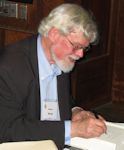
What A Wonderful Weekend! The Weather Was Variable, With Overcast Friday And Saturday, Lovely Sunshine Sunday, And Light Clouds Monday.
Our keynote speaker, Dr. Bob Hirst, Head of the Mark Twain project at the University of California at Berkeley, almost brought Mark Twain back to life for us. It is overwhelming to contemplate the huge quantity of material that Mark Twain produced over his lifetime (thousands of letters and articles, as well as books and opinions about pretty much everything). Dr. Hirst let us in on some of the editing difficulties and secrets that are required to unscramble the truth. We are looking forward to the definitive publication of Twain’s Autobiography. This was truly a feast for the mind and heart.
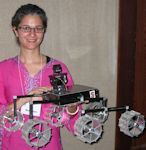
Noël Bakhtian, who received the Phi Beta Kappa E. B. Reed Memorial Scholarship in May 2011 has entitled her talk "From the Slow to the Super Fast" (the Flight of Birds to Supersonic Jets).
On Saturday morning, Noël Bakhtian, one of our scholarship recipients, delivered a most entertaining and informative presentation about the universe (Mars in particular) and our progress in exploring and understanding it. She even brought a remote control explorer vehicle that had been produced at Stanford, along with a video of it working its way over rocks and things. Truly a delightful example of what great things our scholarships can produce.
Noël Bakhtian is a Ph.D. candidate in the Aeronautics and Astronautics Department at Stanford University, working in the Aerospace Design Laboratory. As a graduate student, Noël has been the recipient of the Boeing/Flight Global Engineering Student of the Year Award, our E. B. Reed Memorial Scholarship, the Zonta International Amelia Earhart Fellowship, a National Science Foundation Graduate Research Fellowship Award, and the Churchill Scholarship.
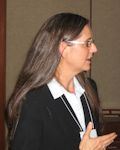
On Saturday afternoon, Judy Filippoff, MSW, who is the Early-Stage Coordinator for the Northern California and Nevada Alzheimer’s Association, shared with us a most enlightened and informative presentation about this disease, with emphasis on the value of early diagnosis and treatment options that are now available. She was joined by Bobbie Johnson, a registered nurse (retired), who has been diagnosed with early onset Alzheimer’s. Together they opened us to dialogue and enabled us to talk about this disease that is gaining momentum in our society today. Early testing was suggested, so that we can establish a benchmark to gauge future changes in our own responses and to initiate early treatment.
Judy Filippoff, MSW, Early-Stage Program Coordinator – “Early-Stage Alzheimer’s Disease: Symptoms, diagnosis and living a life with meaning”. Judy works out of the East Bay Site Office of the Alzheimer’s Association – Greater San Francisco Bay Area, as coordinator for early-stage services throughout the Bay Area, and has been with the Association for over fifteen years. She convenes a consortium of early-stage providers in the San Francisco Bay Area, developeda national group of early-stage program coordinators, and was a member of the National Alzheimer’s Association’s Early-Stage Professional Task Force. She is a frequent presenter at community, family and professional conferences on early-stage issues. She has over 30 years of experience working with people with Alzheimer’s Disease, their families, and health care professionals throughout the Bay Area.
Bobbie Johnson worked for years as an RN, and was recently diagnosed as having Alzheimer’s Disease. She briefly shared her experiences with us before Ms. Filippoff’s talk.
%20Cranna150.jpg)
Saturday evening, Dr. Kip Cranna, Director of Musical Administration for the San Francisco Opera, held us enthralled as he explored with us (showing marvelous video clips) the way in which composers translate literary works into operas. Video examples compared print, film, and operatic versions of works like Johann Goethe’s “Faust,” Pierre Choderlos de Laclos’ “Les Liaisons Dangerousness,” and Tennessee Williams’ “A Streetcar Named Desire.” We were also delighted to learn about how the present generation of opera composers finds material and inspiration for producing new works. Opera is certainly not a closed canon.
Clifford (Kip) Cranna - From the Page to the Stage: Transforming Literature into Opera
San Francisco Opera’s longtime Director of Artistic AdministrationNow in his 33rd year with San Francisco Opera, Dr. Cranna earned his Ph.D. in musicology at Stanford University, and teaches at the San Francisco Conservatory of Music. He writes and lectures frequently on opera and is a regular moderator for the San Francisco Opera Guild’s “Insight” panel discussions. He has managed the commissioning of many new operas by composers such as Philip Glass, John Adams, and André Previn. For many years he was Program Editor and Lecturer for the Carmel Bach Festival. In 2008 he was awarded the San Francisco Opera Medal, the company’s highest honor.
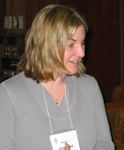
On Sunday afternoon Ms. Betsy Gilliland, a graduate student at UC Davis and a Phi Beta Kappa member from Brown University, shared with us her research into the teaching of academic English to entering freshman at universities. Many students who are fluent in the spoken word do not know how to write essays and papers in coherent and understandable language that is acceptable at the university level. We hope she can help with this difficult situation.
Betsy Gilliland will give a talk on the "Academic Literacy for California's Adolescent English-Language Learners". She is the daughter of our Association president, Mary Turner Gilliland.
Betsy Gilliland (ΦBK Brown 1995) is currently a Ph.D. candidate in the School of Education at UC Davis, with an emphasis in Language, Literacy, and Culture. Her dissertation research is an ethnographic study of three English classrooms at one Central Valley high school, examining the ways that English-language learners develop an understanding of academic language and literacy practices. Prior to starting her doctoral studies, Betsy taught English as a foreign language as a Peace Corps volunteer in Uzbekistan. She will be talking about her current research and the implications for high schools in preparing California's linguistically diverse students for college and beyond.
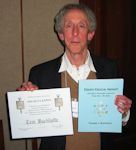
On Sunday evening Dr. Tom Buckholtz, a man of varied experience in industry and government, opened a dialogue with us about ways to begin thinking “outside the box” as we approach the many problems of our modern society. He shared examples from his own past of ways in which small changes in thinking brought about significant insights for later use.
Thomas J. Buckholtz - From Great Potential to Not-So-Great Effects - What is society missing? What we can do about it?
Dr. Thomas J. Buckholtz has made contributions to innovations in business, government, and technology and for society and the environment. Instances include three information technologies, three information-technology marketplace business practices, a United States nationwide movement to improvement governmental service to the public, a national grassroots politics program, a Rotary worldwide service program, and the preserving of 4 miles of southern California coastline. He has served as an executive leading a $1 billion business unit, corporate officer and advisor for startups, co-CIO (chief information officer) for the United States federal government’s Executive Branch, program leader catalyzing innovation throughout Pacific Gas and Electric Company, and business advisor and innovation consultant. Tom authored books including "Information Proficiency" and "Create Crucial Insight." He earned a B.S. in mathematics from the California Institute of Technology (and was a member of Tau Beta Pi) and a Ph.D. in physics from the University of California, Berkeley.
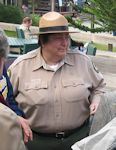
On Monday morning we found ourselves in the company of Ranger Roxanne Jacobus, who shared with us her enthusiasm and extensive knowledge of Julia Morgan. As many times as we go on her tour, we always feel richly rewarded for the time spent visiting Ms. Morgan’s elegant creations and reminiscing about the lives of YWCA girls almost a hundred years ago.
Ranger Roxann has spent many years researching the works of Julia Morgan, especially as they pertain to Asilomar. Asilomar is the largest collection of Miss Morgan’s architecture in one location. Ranger Roxann knows Asilomar and leads a fascinating and enlightening tour that is a delight to everyone, and especially to those of us who have shared it with her many times in the past.
2012 photos by Jud Goodrich
